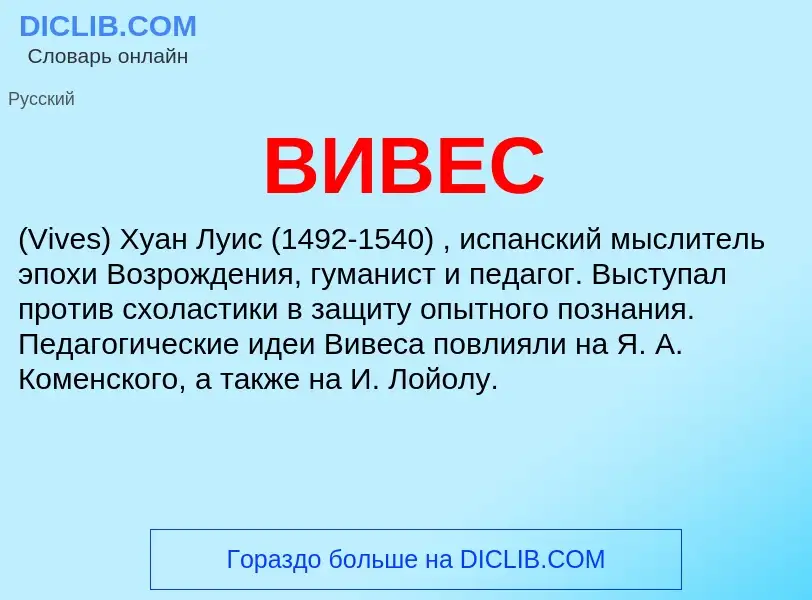Enter a word or phrase in any language 👆
Language:
Translation and analysis of words by ChatGPT artificial intelligence
On this page you can get a detailed analysis of a word or phrase, produced by the best artificial intelligence technology to date:
- how the word is used
- frequency of use
- it is used more often in oral or written speech
- word translation options
- usage examples (several phrases with translation)
- etymology
What (who) is Вивес - definition
СТРАНИЦА ЗНАЧЕНИЙ В ПРОЕКТЕ ВИКИМЕДИА
ВИВЕС
(Vives) Хуан Луис (1492-1540) , испанский мыслитель эпохи Возрождения, гуманист и педагог. Выступал против схоластики в защиту опытного познания. Педагогические идеи Вивеса повлияли на Я. А. Коменского, а также на И. Лойолу.
Вивес
(Vives)
Хуан Луис (6.3.1492, Валенсия, - 6.5.1540, Брюгге), испанский философ, гуманист и педагог. Профессор в университетах Лувена и Оксфорда. Автор около 60 работ на латинском языке. Был в дружеских отношениях с Эразмом Роттердамским (См. Эразм Роттердамский) и Т. Мором. Выступая против схоластики и видя основу познания в непосредственном наблюдении и эксперименте, В. во многом предварил опытный метод Ф. Бэкона. В. проложил новые пути в психологии ("О душе и жизни", 1538) и педагогике, считая главным вопрос не о том, что есть душа, а - каковы её проявления. Подробно рассмотрел вопрос об ассоциации идей и природе памяти. В. оказал влияние на Я. А. Коменского (См. Коменский), а также И. Лойолу (См. Лойола) и его теорию иезуитского воспитания. Дальнейшее развитие идеи В. получили в творчестве испанского философа-материалиста Х. Уарте.
Соч.: Obras completas, t. 1-2, Madrid, 1947-48.
Лит.: История философии, т. 1, М., 1940, с. 35-36; Ланге Ф. А., История материализма и критика его значения в настоящем, пер. с нем., т. 1, К. - Хар., [1899-1900]; Maranón С., Luis Vives, Madrid, 1942; Urmeneta F. de, La doctrina psicológica у pedagógica de Luis Vives, Barcelona, 1949.
Д. Претель.
Вивес-и-Роч, Амадеу
Амедеу Вивес; Амедео Вивес; Вивес, Амедео; Вивес-и-Ройг; Амедеу Вивес-и-Ройг; Вивес-и-Ройг Амедеу; Вивес-и-Ройг А.; Вивес-и-Ройг, Амедеу; Амадеу Вивес-и-Роч; Amadeu Vives i Roig
Амадеу Вивес-и-Роч (; 18 ноября 1871, Кольбато — 1 декабря 1932, ) — испанский композитор каталанского происхождения.
Wikipedia
Вивес
Ви́вес (исп. Vives) — фамилия, распространённая в испаноязычных странах.
Известные носители:
- Вивес, Гильем (род. 1993) — испанский баскетболист.
- Вивес, Карлос (род. 1961) — колумбийский певец.
- Вивес, Хуан Луис (1492—1540) — испанский философ.
- Вивес, Элисенда (род. 1955) — постоянный представитель Андорры при ООН (с ноября 2015 года).
- Валор-и-Вивес, Энрик (1911—2000) — валенсийский филолог и актёр-рассказчик.
- Вивес-и-Роч, Амадеу (1871—1932) — испанский композитор.
- Вивес-и-Сисилья, Жоан Энрик (род. 1949) — испанский священнослужитель, архиепископ Урхельский, сокнязь Андорры (с 2003).
- Вивес-и-Туто, Хосе де Каласанс (1854—1913) — испанский куриальный кардинал.
- Вивес-и-Фелиу, Хуан Мигель де (ум. 1809) — испанский генерал.
- Маньянет-и-Вивес, Иосиф (1833—1901) — святой Римско-католической церкви, священник.
- Льягостера Вивес, Нурия (род. 1980) — испанская теннисистка.
- Рубио Вивес, Рикард (Рики; род. 1990) — испанский баскетболист.
Examples of use of Вивес
1. Ее соперницей будет испанка Нурия Льягостера-Вивес.
2. Чань Юнянь (Тайвань) - Льягостера-Вивес (Испания) - 6:2, 6:3.
3. Льягостера-Вивес (Испания) - Салерни (Аргентина) 6:0, 6:4.
4. Гарбин (Италия, 1') - Льягостера-Вивес (Испания) 6:4, 6:3.
5. Льягостера-Вивес (Испания) - БАРДИНА (Россия) - 6:2, 6:2.



